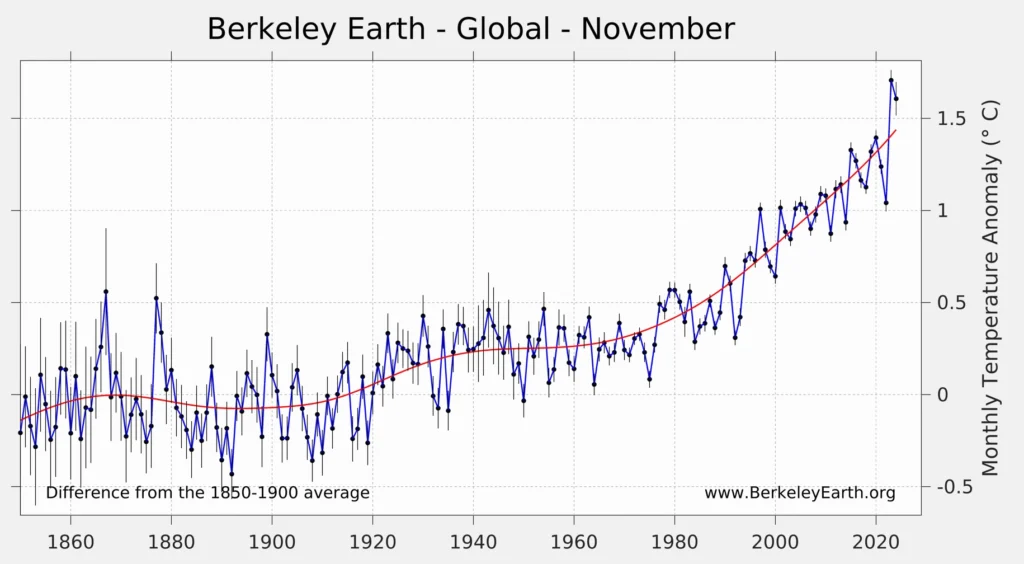November 2024 Temperature Update: Berkeley Earth Sounds Alarm on Record-High Global Temperatures

Berkeley Earth, the nonprofit providing data-driven climate science insights, has published their November 2024 global temperature update revealing some eye-opening data-based facts about global warming.
Berkeley Earth’s analysis shows November 2024 was the second warmest November ever on record.
Global temperature recorded for November 2024 show that the month was 1.61°C hotter above preindustrial levels. This is a short term rise above the 1.5°C Paris Agreement limit set by United Nation Framework Convention on Climate Change.
Although this doesn’t exceed the Paris Agreement’s long-term target, it signals how close we are to crossing it. But, Berkeley Earth do ring the alarm bells, saying, “Unless sharp reductions in man-made greenhouse gas emissions occur soon, the long-term average is likely to pass 1.5 °C during the late 2020s or early 2030s.”
According to Berkeley Earth data, 18 countries set new heat records for the month of November ever since records are being kept. The data shows that 2024 almost certain to be the warmest year on record beating the temperature record of 2023. This rise in global mean temperature is driven mainly by human-induced climate change. Fossil fuel use continues to surge and yet to peak releasing immense of heat-trapping gases in the Earth’s atmosphere.

Key Highlights – November 2024 Temperature Update
- November 2024 was the second warmest November globally since 1850, just behind November 2023.
- Global mean temperature anomaly for the 12-month moving-average: 1.62 ± 0.07 °C above the 1850-1900 average.
- 18 countries, including Spain, Singapore, and Algeria, experienced their warmest November on record.
- 2024 is almost certain to be the warmest year in recorded history.
- Sixteen of the last 18 months set or tied temperature records (September 2024 and November 2024 are the only exceptions).
- November 2024 is the 17th consecutive month with temperature at least 1.5 °C warmer than the corresponding 1850 to 1900 monthly average.
- Land Areas: The second warmest November since 1850, on average 2.34 ± 0.19 °C above the 1850 to 1900 average.
- Oceans: Also the second warmest November behind November of last year, with temperatures 1.08 ± 0.11 °C above the 1850-1900 average.
“In total, we estimate that 18 countries had their warmest national-average November on record, these were:
Algeria, Brunei, China, Federated States of Micronesia, Guyana, Madagascar, Mongolia, Morocco, Oman, Pakistan, Palau, Portugal, Seychelles, Singapore, Solomon Islands, Spain, United Arab Emirates, and Vanuatu”
Berkeley Earth – November 2024 Temperature Update
Global warming is accelerating at 0.19 °C per decade, driven by greenhouse gas emissions, reports Berkeley Earth.
“Firstly, man-made global warming has been raising the Earth’s temperature by about 0.19 °C/decade (0.34 °F/decade). This is a direct consequence of the accumulation of additional greenhouse gases in the atmosphere, especially carbon dioxide. This is the primary factor responsible for long-term warming,” states the global summary authored by Robert Rohde.
The now-ended El Niño reportedly spiked temperatures in 2023-2024. A weak La Niña may emerge soon, bringing moderate cooling in 2025. “If a La Niña develops, it would almost certainly ensure than 2025 is cooler than 2024,” according to the update.
2024 forecast for the last month of the year show that there is a 99% chance of 2024 becoming the warmest year on record. Both land and ocean annual averages are also likely to set records. The annual average is projected to exceed the 1.5 °C threshold.
As per Berkeley Earth, is almost certain that 2024’s annual average temperature will exceed 1.5°C above the 1850-1900 baseline.






